Are you ready to explore a vibrant world of tasty and nutritious vegetables that all begin with the letter G? From crisp and refreshing to hearty and comforting, these vegetables add flavor and color to any meal. Join us as we uncover some delicious G-rated greens and more, perfect for vegetable lovers and curious cooks alike!
1. Garbanzo Beans (Chickpeas)
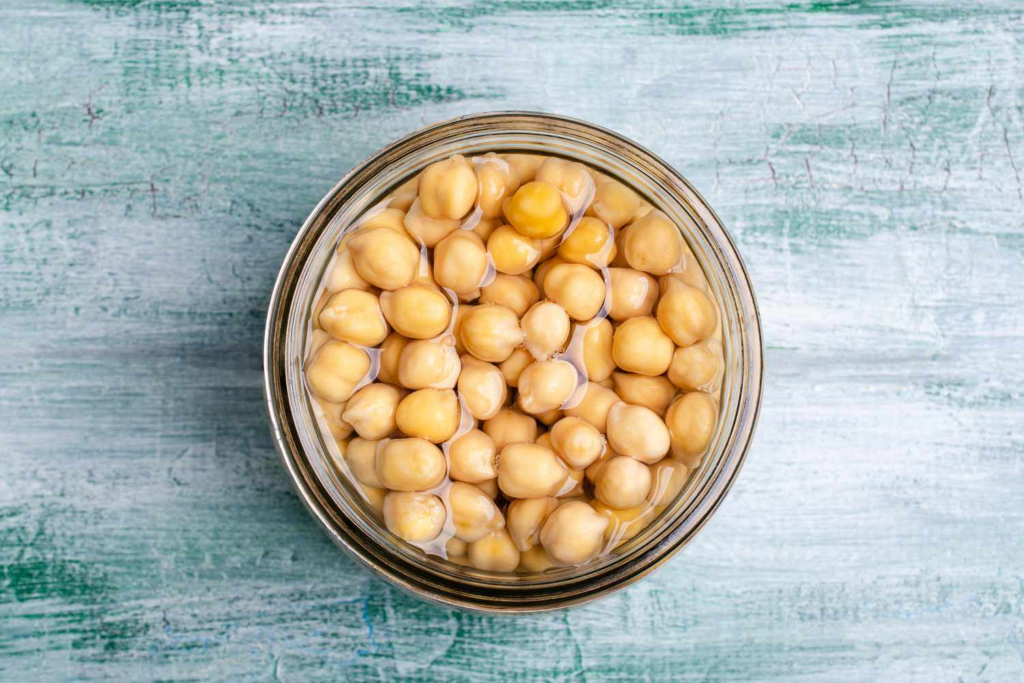
Garbanzo beans are small, round legumes that are protein-rich and versatile. They can be boiled, roasted, or blended into hummus.
Nutritional Benefits:
- Calories: 164 kcal per 100g
- High in protein, fiber, folate, and iron
- Contains antioxidants supportive of health
How to Eat or Use It:
- Great in salads, stews, and snacks like roasted chickpeas
- Ideal for making dips like hummus
Diet Compatibility:
- Vegan, gluten-free, high-protein
2. Garden Cress
Garden cress is a small, peppery leafy green that adds a fresh flavor to salads and sandwiches. It’s easy to grow in your garden or indoors.
Nutritional Benefits:
- Calories: 11 kcal per 100g
- Rich in vitamins A, C, and K
- High in antioxidants and fiber
How to Eat or Use It:
- Best in salads, sandwiches, or as a garnish
- Can be used in smoothies for a peppery boost
Diet Compatibility:
- Vegan, low-calorie
4. Garden Peas
Garden peas are sweet, plump green peas enjoyed fresh or cooked. They add color and sweetness to many dishes.
Nutritional Benefits:
- Calories: 81 kcal per 100g
- Good source of vitamins A, C, and K
- Rich in fiber and antioxidants
How to Eat or Use It:
- Great in salads, soups, and side dishes
- Can be enjoyed raw or cooked
Diet Compatibility:
- Vegan, gluten-free
3. Garden Rocket (Arugula)

Garden rocket, also known as arugula, is a leafy green with a spicy, peppery taste. It’s perfect for salads and garnishing dishes.
Nutritional Benefits:
- Calories: 25 kcal per 100g
- Rich in vitamins A, C, K, and folate
- Contains antioxidants and anti-inflammatory compounds
How to Eat or Use It:
- Use fresh in salads, sandwiches, or as a pizza topping
Diet Compatibility:
- Vegan, low-calorie
4. Garlic
Garlic is a pungent bulb used worldwide to add flavor to savory dishes. It also has health benefits like supporting immunity.
Nutritional Benefits:
- Calories: 149 kcal per 100g
- Rich in vitamins B6 and C, manganese, and selenium
- Contains allicin which has anti-inflammatory properties
How to Eat or Use It:
- Use minced in cooking, roasted, or as a flavor base
Diet Compatibility:
- Vegan, keto-friendly in small amounts
5. Garlic Chives
Garlic chives are long, flat leaves with a garlic flavor, often used in Asian dishes and garnishes.
Nutritional Benefits:
- Calories: 30 kcal per 100g
- Good source of vitamins A, C, and minerals like calcium
- Contains antioxidants
How to Eat or Use It:
- Perfect for salads, stir-fries, and garnishing dishes
Diet Compatibility:
- Vegan, gluten-free
6. Garlic Scapes
Garlic scapes are the flower stalks of garlic plants, with a mild garlic flavor. They are a seasonal delicacy.
Nutritional Benefits:
- Calories: 20 kcal per 100g
- Contains vitamins C and A, antioxidants
- Rich in sulfur compounds beneficial for health
How to Eat or Use It:
- Great chopped in salads, stir-fries, or grilled
Diet Compatibility:
- Vegan
7. Gem Squash
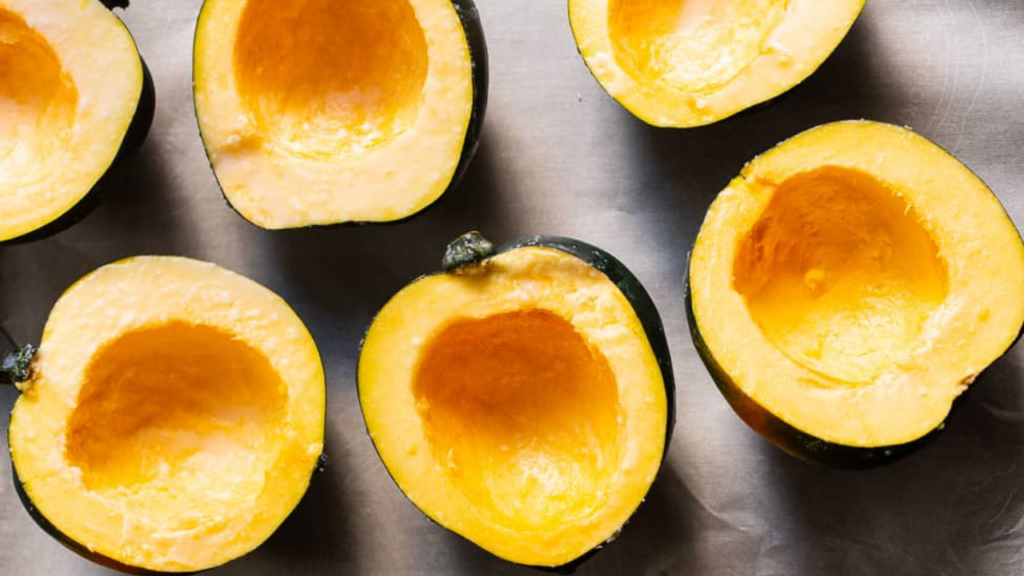
Gem squash is a small, sweet, and starchy vegetable often baked or steamed. It’s popular in African cuisine.
Nutritional Benefits:
- Calories: 36 kcal per 100g
- Provides vitamin A, C, and potassium
- Contains antioxidants and fiber
How to Eat or Use It:
- Best when baked, steamed, or stuffed
Diet Compatibility:
- Vegan, gluten-free
8. German Butterball Potato
German Butterball potatoes are buttery, creamy potatoes ideal for roasting, mashing, or baking.
Nutritional Benefits:
- Calories: 80 kcal per 100g
- Contains vitamin C, potassium, and moderate fiber
How to Eat or Use It:
- Great for roasting, frying, or mashing
Diet Compatibility:
- Gluten-free, vegan if prepared without dairy
9. Gherkin (small pickling cucumber)
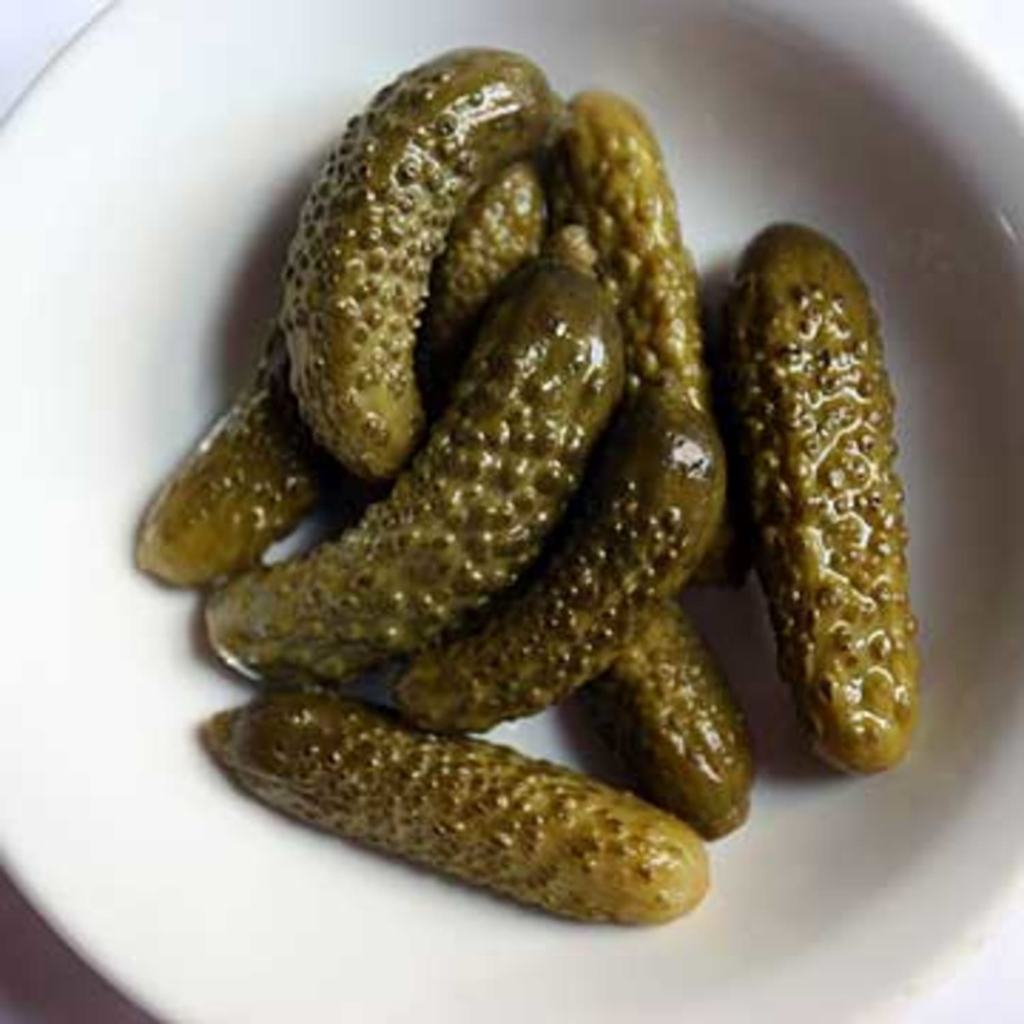
Gherkins are tiny, pickled cucumbers with a tangy flavor, often used in salads, sandwiches, or as a snack.
Nutritional Benefits:
- Calories: 11 kcal per 100g
- Contains vitamins K and A, small amounts of minerals
- Low in calories and carbs
How to Eat or Use It:
- Ideal in salads, on cheese platters, or as a snack
Diet Compatibility:
- Vegan, keto-friendly
10. Gigante Bean (Large White Bean)

Gigante beans are large, creamy white beans loved in Mediterranean dishes, often used in stews and salads.
Nutritional Benefits:
- Calories: 130 kcal per 100g
- Rich in protein, fiber, iron, and folate
- Supports digestion and energy levels
11. Glasswort (Salicornia, also called samphire)
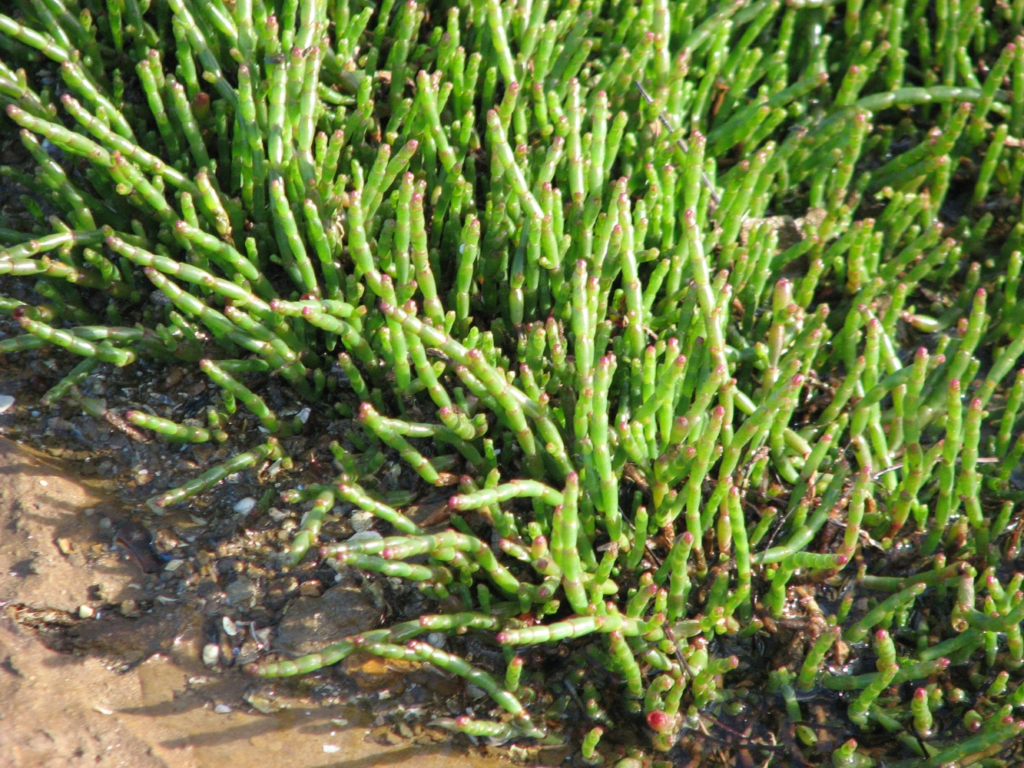
Glasswort is a salty, crunchy plant often used as a garnish or in salads, especially in seaside cuisines.
Nutritional Benefits:
- Calories: 25 kcal per 100g
- Rich in sodium, vitamin C, and antioxidants
- Supports immune health due to vitamin C
How to Eat or Use It:
- Enjoy raw in salads or lightly steamed as a vegetable
Diet Compatibility:
- Vegan, low-calorie
12. Globe Artichoke
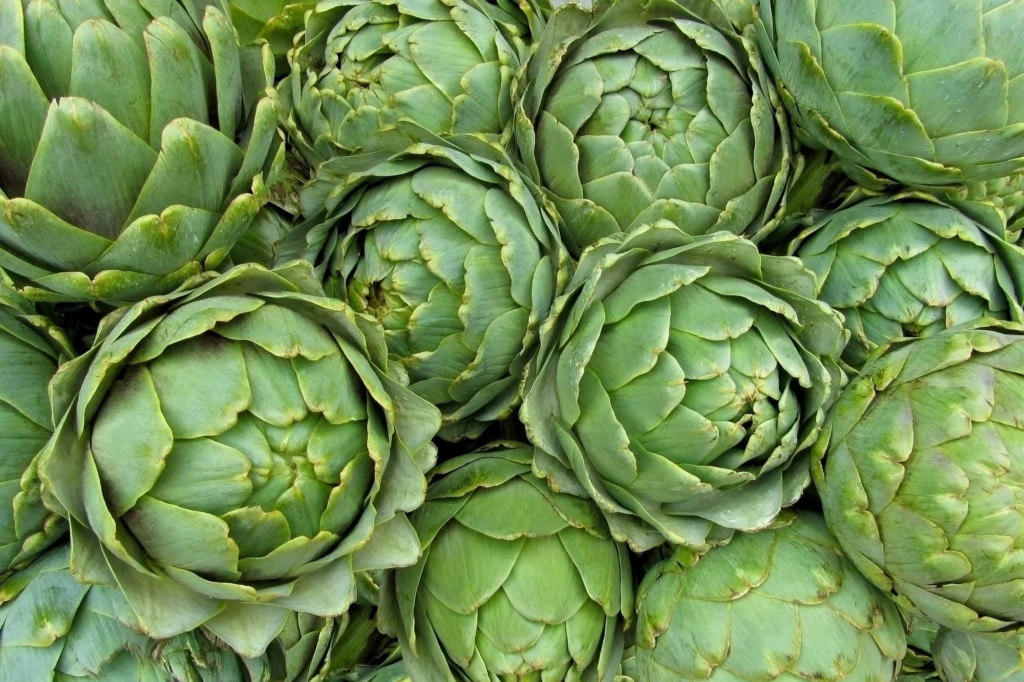
Globe artichokes are tender, edible flower buds with a slightly nutty flavor. They are often steamed or grilled.
Nutritional Benefits:
- Calories: 47 kcal per 100g
- High in fiber, vitamin C, K, and antioxidants
- Supports liver health and digestion
How to Eat or Use It:
- Best steamed, boiled, or grilled, then dipped in sauces
Diet Compatibility:
- Vegan, gluten-free
13. Gobo (Burdock Root)

Gobo is a root vegetable with a sweet, earthy flavor. It is popular in Japanese cuisine and can be boiled, roasted, or sautéed.
Nutritional Benefits:
- Calories: 50 kcal per 100g
- Rich in fiber, antioxidants, and vitamins A and B
How to Eat or Use It:
- Use in soups, stir-fries, or salads
Diet Compatibility:
- Vegan, gluten-free
14. Gold Rush Squash
Gold Rush squash is a bright orange, sweet squash that is delicious roasted or baked, perfect for fall dishes.
Nutritional Benefits:
- Calories: 34 kcal per 100g
- High in vitamin A, C, and fiber
How to Eat or Use It:
- Roast, bake, or puree into soups and pies
Diet Compatibility:
- Vegan, gluten-free
15. Golden Samphire
Golden samphire is a salty, crunchy plant similar to glasswort, used as a vegetable or garnish.
Nutritional Benefits:
- Calories: 25 kcal per 100g
- Rich in vitamin C and minerals
How to Eat or Use It:
- Enjoy raw in salads or lightly cooked
Diet Compatibility:
- Vegan, low-calorie
16. Gongura (Roselle leaves)
Gongura is a tangy leafy green common in Indian cuisine, often used in chutneys and curries.
Nutritional Benefits:
- Calories: 23 kcal per 100g
- High in vitamins A, C, and antioxidants
How to Eat or Use It:
- Cooked in stews or made into chutneys
Diet Compatibility:
- Vegan, gluten-free
17. Good King Henry
Good King Henry is a leafy green vegetable with a mild spinach-like flavor, often cooked or added to soups.
Nutritional Benefits:
- Calories: 31 kcal per 100g
- Rich in vitamins C, A, and minerals like iron
How to Eat or Use It:
- Best cooked, added to stews and sautés
Diet Compatibility:
- Vegan, gluten-free
18. Grape Leaves
Grape leaves are used to make stuffed dishes like dolma, easily wrapping rice, herbs, and meat.
Nutritional Benefits:
- Calories: 45 kcal per 100g
- Contains vitamins A, C, and minerals like calcium
- Provides fiber and antioxidants
How to Eat or Use It:
- Stuffed with rice or meat fillings and cooked
Diet Compatibility:
- Vegan, gluten-free
19. Great Northern Bean
Great Northern beans are medium-sized white beans, perfect for hearty soups and stews.
Nutritional Benefits:
- Calories: 120 kcal per 100g
- High in protein, fiber, iron, and folate
How to Eat or Use It:
- Cooked in soups, casseroles, or salads
Diet Compatibility:
- Vegan, gluten-free
20. Green Amaranth
Green amaranth is a leafy green vegetable rich in nutrients, often sautéed or blanched as a side dish.
Nutritional Benefits:
- Calories: 23 kcal per 100g
- Vitamins A, C, K, iron, and calcium
- Contains antioxidants and anti-inflammatory compounds
How to Eat or Use It:
- Cooked as greens, added to soups or stir-fries
Diet Compatibility:
- Vegan, gluten-free
21. Green Beans
Green beans are crisp, tender members of the legume family, perfect for steaming, boiling, or salads.
Nutritional Benefits:
- Calories: 31 kcal per 100g
- Vitamins C, K, and folate
- Rich in fiber and antioxidants
How to Eat or Use It:
- Steamed, boiled, or sautéed as a side dish
Diet Compatibility:
- Vegan, gluten-free
23. Green Onion (Scallion)
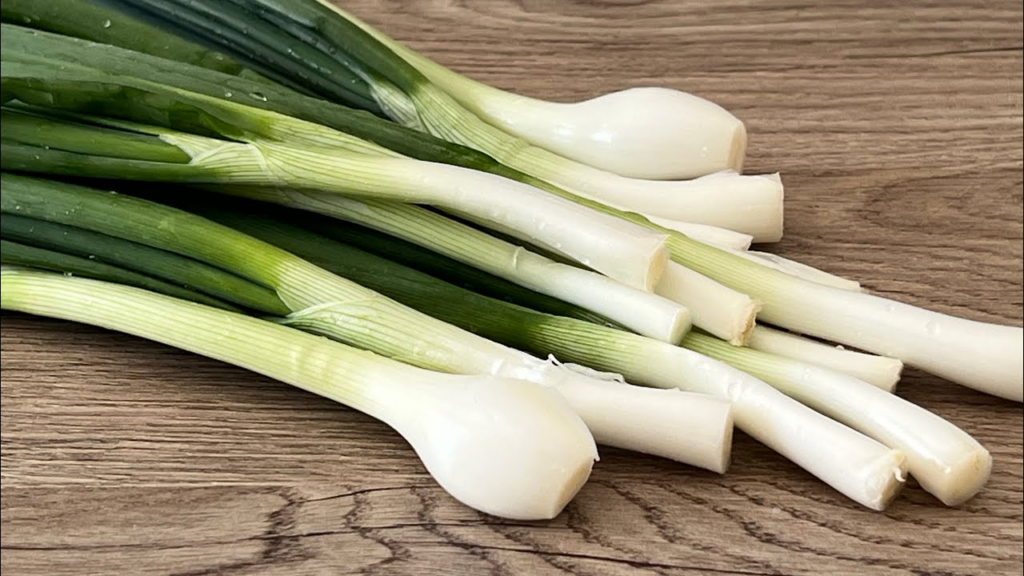
Green onions are mild-tasting onions with green stalks and white bulbs, great for garnishing or adding flavor.
Nutritional Benefits:
- Calories: 32 kcal per 100g
- Vitamins A, C, K, and folate
- Contains antioxidants benefitting immune health
How to Eat or Use It:
- Raw in salads, as a garnish, or in stir-fries
Diet Compatibility:
- Vegan, low-calorie
24. Green Pepper
Green peppers are crunchy, slightly bitter vegetables used fresh in salads, stuffed, or cooked in various dishes.
Nutritional Benefits:
- Calories: 20 kcal per 100g
- High in vitamin C and antioxidants
How to Eat or Use It:
- Fresh in salads, grilled, or stuffed
Diet Compatibility:
- Vegan, gluten-free
25. Green Soybeans (Edamame)
Edamame are young soybeans, often boiled or steamed and sprinkled with salt. They’re a protein-rich snack or addition to meals.
Nutritional Benefits:
- Calories: 122 kcal per 100g
- High in protein, fiber, vitamins C and K
- Contains antioxidants and phytoestrogens
How to Eat or Use It:
- Best boiled or steamed and eaten as a snack or in salads
Diet Compatibility:
- Vegan, gluten-free
26. Green Tomato
Green tomatoes are unripe tomatoes with a tart flavor, often fried, pickled, or used in salsa.
Nutritional Benefits:
- Calories: 32 kcal per 100g
- Vitamins A, C, and antioxidants
How to Eat or Use It:
- Fried as chips or used in salsas and relishes
Diet Compatibility:
- Vegan, gluten-free
27. Green Zucchini

Green zucchini is a tender, mild-tasting squash used in grilling, roasting, or stir-fries.
Nutritional Benefits:
- Calories: 17 kcal per 100g
- Contains vitamins A, C, and manganese
- Low in calories and source of antioxidants
How to Eat or Use It:
- Grilled, sautéed, or spiralized into noodles
Diet Compatibility:
- Vegan, gluten-free

Jean Smith is a fitness enthusiast and blogger who focuses on fitness and a healthy lifestyle. She is passionate about assisting people in living healthier lifestyles and is constantly on the lookout for new and creative methods to stay fit and healthy. Her articles are excellent resources for anyone interested in improving their health and fitness.
